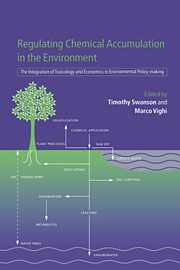 Regulating Chemical Accumulation in the Environment
Regulating Chemical Accumulation in the Environment Published online by Cambridge University Press: 17 August 2009
Introduction
This chapter examines the reasons why private decision-making on the part of agricultural chemical manufacturers might lead to products with socially undesirable characteristics being sold in socially inefficient quantities. The source of the problem is market failure: some significant economic factor goes ‘unpriced’, so that economic activity is undertaken without consideration of its full impact. Two market failures will be considered. The first is the presence of externalities (both the standard story of a damage externality, in which agents considered only the private, and not social, costs of their actions; and a ‘surplus externality’, arising because profit-maximising firms consider only the marginal consumer, instead of all consumers, in their production decisions). The second is imperfect competition – the effect of the structure of the agriculture chemical manufacturing industry (a small number of large multinationals competing in the same product market) on producer's choices of chemical characteristics.
Externalities
An externality arises when the decisions of some economic agents (individuals, firms, governments) – whether in production, in consumption, or in exchange – affect other economic agents, and are not included in the priced system of commodities, i.e. they are not compensated. An alternative way of expressing this problem is to say that property rights are not assigned appropriately, so that the incidence of effect does not coincide with the distribution of legally recognised controls. A third equivalent statement is that economic agents consider only their private marginal costs when making decisions; they do not consider the total, or social (marginal), costs of their actions. It is the gap between private and social marginal costs that gives rise to the externality.
To save this book to your Kindle, first ensure [email protected] is added to your Approved Personal Document E-mail List under your Personal Document Settings on the Manage Your Content and Devices page of your Amazon account. Then enter the ‘name’ part of your Kindle email address below. Find out more about saving to your Kindle.
Note you can select to save to either the @free.kindle.com or @kindle.com variations. ‘@free.kindle.com’ emails are free but can only be saved to your device when it is connected to wi-fi. ‘@kindle.com’ emails can be delivered even when you are not connected to wi-fi, but note that service fees apply.
Find out more about the Kindle Personal Document Service.
To save content items to your account, please confirm that you agree to abide by our usage policies. If this is the first time you use this feature, you will be asked to authorise Cambridge Core to connect with your account. Find out more about saving content to Dropbox.
To save content items to your account, please confirm that you agree to abide by our usage policies. If this is the first time you use this feature, you will be asked to authorise Cambridge Core to connect with your account. Find out more about saving content to Google Drive.